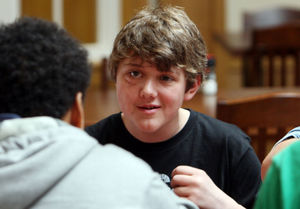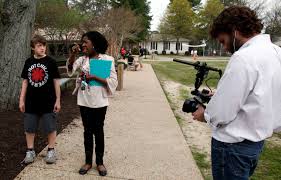Connie's Story
When I finally had a chance to meet Connie in person several years ago, it was after many months corresponding through a variety of means from AVMSurivors.org to good ol' email. I was drawn to her because of her unyielding determination as a mother to be as knowledgeable as possible about her son's condition (AVM) and make the best choices for his care. We finally met at the annual International Symposium on Hemangiomas and Vascular Malformations of the Head and Neck in Little Rock, Arkansas, I was moved by how observant, how supportive, and how motivated she was. She encouraged me to keep on raising awareness and sharing our stories. I am honored to shed a little more light on hers.
Hometown: Pennsylvania
When my child was born, I thought: How blessed I am to have this child and what an easy birth compared to my first!
As a parent, I’ve advocated for my child’s health by: Educating myself and reaching out to the most knowledgeable doctors experienced with caring for patients with the condition. Also connecting with families who are also effected by the same condition.
In 10 years, I will have: Aged 10 years with teenagers!
If I could change one thing about the world, I would: This is a hard question...I am tending to think towards big miraculous changes such as no natural disasters, diseases, etc.
My favorite quote/scripture/affirmation statement is:
I think a hero is an ordinary individual who finds strength to persevere
and endure in spite of overwhelming obstacles.
~ Christopher Reeve
and endure in spite of overwhelming obstacles.
~ Christopher Reeve
1) Describe the medical challenge of the person for whom you provide care? What was the first sign?
The challenge of rare medical conditions is finding knowledgeable medical professionals locally and making decisions on your course of action for treatment when all doctors do not agree on the same treatment or when the treatment is experimental. The first sign was unexplained bleeding and inflammation that could not be explained by doctors.
2) How did he/she eventually come to receive treatment?
After much research, consultations and learning of many other families experiences, a decision was made to treat.
3) Who have been his/her main doctors, where has he/she been treated, and how has the care been?
Dr. Richter in Little Rock, AR.
4) How do you feel his/her health will progress in the future?
This is uncertain.
5) How has caretaking for someone with a medical challenge positively impacted your life?
It gave me a new perspective on life and how I live it. I no longer worry or allow myself to be bothered by trivial things.
6) What has been the biggest challenge with battling a medical challenge from a caretaker’s perspective?
Watching and knowing that this is a battle my child will face his entire life.
7) What do you think a documentary or other content about those surviving a medical challenge can achieve?
It will bring awareness to the condition and teach others that the people and children dealing with rare conditions are Super Heroes! It takes super strength to get through the obstacles on such a journey, living with a rare complicated disease. People need to see them as a Super Hero not a poor thing with a medical problem.
8) What are your hopes for the future of research for the medical challenge involved?
My ultimate hope is that a cure will be found. Until then, I hope for better treatment options to help the condition.
9) What has been the biggest lesson you've learned throughout your journey thus far?
Sometimes Doctor's and Insurance Companies have to be educated on the rare condition you are faced with.
10) What are three things you wish you had known as a caretaker or have learned that you feel could help other caretakers in your position?
1 - Do not do any invasive testing until you know it is absolutely necessary at that current time.
2 - Research, Research, did I say Research? Before your consultations. Rare conditions are sometimes as confusing to doctors as they are to us. Learn as much as possible through medical reports and more importantly from those who have already been on the same medical journey. Share the information with your doctor's and others.
3 - Keep a record/file of any most recent medical test (MRI's, etc) on hand, in case you need them in a hurry.






